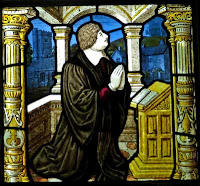 |
| Robert Herrick |
My
story, “How Great Our Joy,” centers around the experience of two young people,
Maxwell and Astraea. They work together at a school for special needs students.
Both are musicians; in fact, Astraea does musical therapy. On occasion they
play concerts together at the school are mutually respectful of each other’s
mastery and competence. Maxwell is a Christian; Astraea is a pagan. One of
Astraea’s pagan friends, Callie, finds out she does music with a Christian and
unloads, telling her that Christianity has caused the deaths of more people
than any other cause in history and that Christians burned nine million women at
the stake in medieval Europe. She should not be associating with him in any
way. “He wants to kill you,” she says.
Astraea
finds this absurd but asks Maxwell about it. He says these are common myths
circulated by people who dislike Christianity and they are fabrications. When
Astraea researches the claims, she finds he is correct. One night she and
Callie go to a coffee bar. Maxwell, and a very beautiful young women, come on
stage as the musical act for the night. Callie wants to leave, but Astraea
wants to hear the concert. As they listen, she pines that the woman with Maxwell is
so much more beautiful than she; these feelings make her realize she is
attracted to him despite their religious difference. At intermission, she
finds out the woman is Maxwell’s sister. Callie leaves. Maxwell and his sister
talk with Astraea. He ends up asking her out. Despite opposition from her
friends and parents, she begins dating him.
 |
| Winter Solstice Celebration |
He
attends a Solstice Celebration with Astraea and her family; she goes to a
Church service with him (it is near Christmas and she knows some of the carols
they sing just from hearing them so much at this time of the year). Astraea
feels love for Maxwell, but also realizes how much opposition and they are
facing and the numerous complications that could derail their relationship. She
wonders what she might do to show her love and hits upon a plan. She goes to two people who are yoga adepts
and unfolds it to them. They agree to help her. Since all points of time exist
at the same time, they tell her, they can bring about what she has asked.
 |
| Robert Herrick's Church in Devonshire |
Through
the practitioners’ intervention, Astraea is able to transport her and Maxwell
back in time, to the days of King Charles I, the 1630s, and the church of
Maxwell’s favorite poet Robert Herrick. They attend a service at his church
and, afterwards, get to meet him. When the service is over they help distribute
food to poor parishioners. Herrick himself is charming, earthy, and sincere in
his devotion—despite what she has read about him being an indifferent Christian
or one whose loyalties to the old deities of Greece and Rome were greater than
his allegiance to the Christian faith. She is certain her relationship with
Maxwell can be fruitful—perhaps even end in their being married. They respect
each other’s faith and can love each other and experience mutuality despite
their differences.
The story
appeared in the journal Eternal Haunted Summer and was reprinted in the anthology Passion Beyond
Words. Eternal Haunted Summer has archived the story and you can
read it here. If you want a print copy, Passion Beyond Words is available here.
For additional books, check out my Amazon Page.
Also, for a good short story and a nice summer read, see my story "Azalea." One of the best I've written.
I would love to hear your comments.
Happy summer reading.
For additional books, check out my Amazon Page.
Also, for a good short story and a nice summer read, see my story "Azalea." One of the best I've written.
I would love to hear your comments.
Happy summer reading.
No comments:
Post a Comment